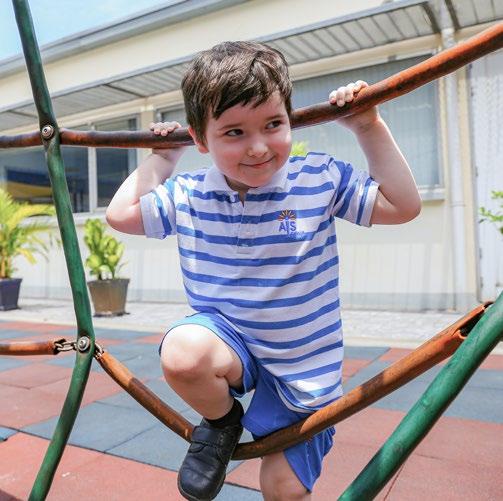
2 minute read
Our Teachers
All expatriate teachers are fully qualified, expertly trained and native English speakers.
Our Vietnamese and language teachers are trained in Western teaching methods to help engage students.
Advertisement
Our teachers are experienced, knowledgeable and passionate professionals, caring for each child individually.
Our well resourced, technology rich classroom environments support the teachers to challenge and encourage students to achieve their best.
Our Kindergarten core values at AIS embrace the uniqueness of each child. We value the importance of relationships and we provide opportunities so that our learners can be the authors of their own learning. Through playful exploration, inquiry and discovery we build caring, confident, capable and curious learners. We are Reggio inspired and embrace the Australian Early Years Framework: Belonging, Being and Becoming.
From the age of three years old (Junior Kindergarten), children follow the International Baccalaureate (IB) Primary Years Programme (PYP), focusing on the Early Years components. In the Infants class they undertake activity-based learning which aligns with the Early Years PYP framework.


The guiding principle in Kindergarten is ‘learning through play and inquiry’. In this way, in a secure but challenging enironment, children can:

Explore, develop and represent learning experiences that help them to make sense of the world
Practise and build up ideas, concepts, and skills
Learn to understand the need for rules
Take risks and make mistakes
Think creatively and imaginatively and be curious Communicate with others as they investigate or solve problems
Develop their sense of identity.
The IB Primary Years Programme (PYP) inquiry based learning encourages the development of knowledge, skills, critical thinking and positive attitudes.

• Specific learning benchmarks and standardised tests are used in each year level to track and analyse progress.

• Student led conferences and the PYP exhibition in Year 6, enable students to own and demonstrate their learning, critical thinking and understanding.
• Specialist subjects taught by qualified specialist teachers, include Music, PE, Swimming, Vietnamese Language & Culture and Art.

• An extensive Extracurricular Activities program provides multiple opportunities for students to excel in music, sport, service and leadership.

Our Lower Secondary School, while continuing to take the inquiry based approach of the PYP, follows the Cambridge Lower Secondary Curriculum to prepare students for the IB Diploma.




In Years 7-9, a broad and balanced curriculum includes English, Maths, Science, Humanities, Physical Education, Swimming, Art, Music, Drama, ICT, Languages and Design & Technology.
Year 10 & 11 students undertake the Cambridge International General Certificate of Secondary Education (IGCSE), which is an internationally recognised qualification taken by students from 140 countries around the world.
Students entering the Senior School undertake one of two pathways via the International Baccalaureate. The IB Diploma is the world’s leading two-year pre-university academic programme. It is highlyregarded by the best universities around the world.

Full Diploma – Students complete six major areas of study (with three at Higher Level) and the Core requirements. To achieve the IB Diploma all components must be completed successfully. Students choose from subjects ensuring breadth and depth in Language & Literature, Language Acquisition, Humanities, Sciences, Mathematics, and the Arts. Core subjects include Theory of Knowledge, the 4000-word Extended Essay and participation in the CAS (Creativity, Activity, Service) programme.
Language & Literature can be studied in Vietnamese, Korean, Japanese, Chinese or the student’s mother tongue.
IB Course – Students not wishing to complete the full Diploma may undertake up to six subjects at either Standard or Higher Level, as well as participate in the CAS programme. The academic programme is complemented by a wide range of co-curricular activities enabling Senior School students to build skills and confidence.









